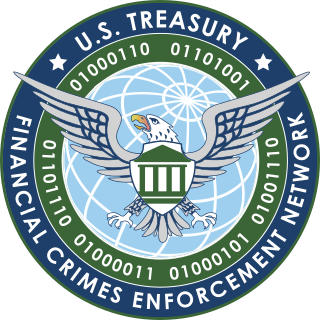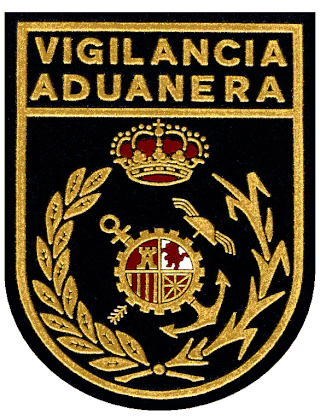
The Financial Crimes Enforcement Network (FinCEN) is a bureau of the United States Department of the Treasury that collects and analyzes information about financial transactions in order to combat domestic and international money laundering, terrorist financing, and other financial crimes.

The Bank Secrecy Act of 1970 (BSA), also known as the Currency and Foreign Transactions Reporting Act, is a U.S. law requiring financial institutions in the United States to assist U.S. government agencies in detecting and preventing money laundering. Specifically, the act requires financial institutions to keep records of cash purchases of negotiable instruments, file reports if the daily aggregate exceeds $10,000, and report suspicious activity that may signify money laundering, tax evasion, or other criminal activities.

The United States Customs Service was a federal law enforcement agency of the U.S. federal government. Established on July 31, 1789, it collected import tariffs, performed other selected border security duties, as well as conducted criminal investigations.

The Federal Ministry of Finance, abbreviated BMF, is the cabinet-level finance ministry of Germany, with its seat at the Detlev-Rohwedder-Haus in Berlin and a secondary office in Bonn. The current Federal Minister of Finance is Christian Lindner (FDP).

Kenneth "Supreme" McGriff is an American convicted former drug lord and gangster from New York City.

The Department of Federal Police is a federal law enforcement agency of Brazil and one of the three national police forces. The other two are the Federal Highway Police, and the National Force. From 1944 to 1967 it was called the Federal Public Safety Department.
Law enforcement in Malaysia is performed by numerous law enforcement agencies and primarily the responsibility of the Royal Malaysia Police. Like many federal nations, the nature of the Constitution of Malaysia mandates law and order as a subject of a state, which means that local government bodies also have a role to play in law enforcement, therefore the bulk of the policing lies with the respective states and territories of Malaysia. Below are some of the law enforcement bodies and agencies of Malaysia.

The Federal Criminal Police Office of Germany is the federal investigative police agency of Germany, directly subordinated to the Federal Ministry of the Interior. It is headquartered in Wiesbaden, Hesse, and maintains major branch offices in Berlin and Meckenheim near Bonn. It has been headed by Holger Münch since December 2014.

Law enforcement in Germany is constitutionally vested solely with the states, which is one of the main features of the German political system.

The Organized Crime Drug Enforcement Task Force (OCDETF) is a federal drug enforcement program in the United States, overseen by the Attorney General and the Department of Justice. The principal mission of the OCDETF program is to identify, disrupt, and dismantle the major drug trafficking operations and tackle related crimes, such as money laundering, tax and weapon violations, and violent crime, and prosecute those primarily responsible for the nation's drug supply.

The Egmont Group of Financial Intelligence Units is an international organization that facilitates cooperation and intelligence sharing between national financial intelligence units (FIUs) to investigate and prevent money laundering and terrorist financing. National FIUs collect information on suspicious or unusual financial activity and are responsible for processing and analyzing the information received. FIUs are normally not law enforcement agencies themselves, findings are shared with appropriate law enforcement or prosecution bodies if sufficient evidence of unlawful activity is found. The Egmont Group is headquartered in Ottawa, Ontario, Canada.

Internal Revenue Service, Criminal Investigation (IRS-CI) is the United States federal law enforcement agency responsible for investigating potential criminal violations of the U.S. Internal Revenue Code and related financial crimes, such as money laundering, currency transaction violations, tax-related identity theft fraud and terrorist financing that adversely affect tax administration. While other federal agencies also have investigative jurisdiction for money laundering and some Bank Secrecy Act violations, IRS-CI is the only federal agency that can investigate potential criminal violations of the Internal Revenue Code, in a manner intended to foster confidence in the tax system and deter violations of tax law. Criminal Investigation is a division of the Internal Revenue Service, which in turn is a bureau within the United States Department of the Treasury.

The Zollfahndungsamt (ZFA) is a German Customs Investigation Office. All ZFAs are directly subordinate to the central Zollkriminalamt which has its headquarters in Cologne. Together they form the Zollfahndungsdienst.

Financial crime is crime committed against property, involving the unlawful conversion of the ownership of property to one's own personal use and benefit. Financial crimes may involve fraud ; theft; scams or confidence tricks; tax evasion; bribery; sedition; embezzlement; identity theft; money laundering; and forgery and counterfeiting, including the production of counterfeit money and consumer goods.

Crime in Switzerland is combated mainly by cantonal police. The Federal Office of Police investigates organised crime, money laundering and terrorism.
A specialist law enforcement agency is a law enforcement agency which specialises in the types of laws it enforces, or types of activities it undertakes, or geography it enforces laws in, or these in combination.

The Customs Surveillance Service is a law enforcement agency of the Spanish Ministry of Finance, integrated in the Spanish Tax Agency. Its responsibilities include the investigation and prosecution of cases involving contraband, illegal drugs, financial evasion and violations, money laundering, surveillance for financial police purposes and the provision of judicial police services. Its activities can be compared with United States agencies like the Drug Enforcement Administration, Bureau of Alcohol, Tobacco, Firearms and Explosives, or some of the U.S. Customs and Border Protection

The Narcotics Control Bureau is an Indian central law enforcement and intelligence agency under the Ministry of Home Affairs, Government of India. The agency is tasked with combating drug trafficking and the use of illegal substances under the provisions of Narcotic Drugs and Psychotropic Substances Act.

The Bundeszollverwaltung is the customs service of the Federal Republic of Germany. It is also the executive and fiscal administrative unit of the federal government and part of the Federal Ministry of Finance. It was founded in 1949 in West Germany. The purpose of the Customs Service is to administer federal taxes, execute demands for payment on behalf of the federal government and federal statutory corporations, monitor the cross border movements of goods with regard to compliance with bans and restrictions, and prevent illicit work.
















